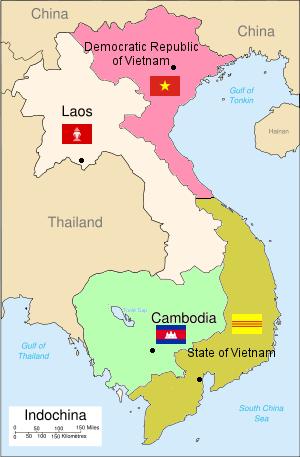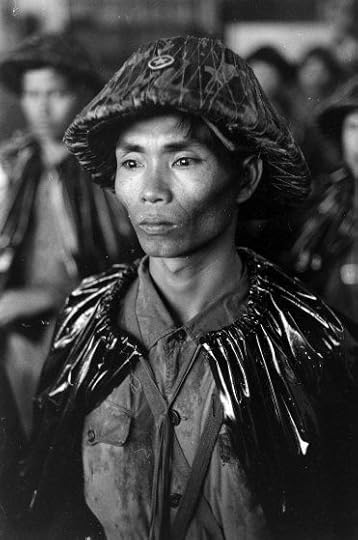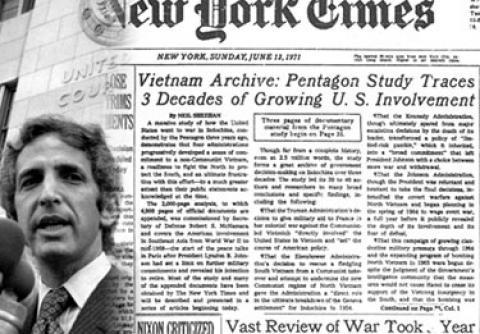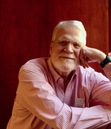Mark Scott Smith's Blog: Enemy in the Mirror, page 50
January 18, 2021
Britain Develops Atomic Bomb
Although several British scientists worked on the Manhattan Project during WWII, after the war the U.S. government ended cooperation on nuclear weapons development.
In 1947, in response to concerns about American isolationism and Britain losing its great power status, the British cabinet decided, to resume efforts to build nuclear weapons.
In October 1952, Britain successfully detonated a plutonium implosion device to become the world’s third nuclear power after the United States and Soviet Union.
Source: Wikipedia
The post Britain Develops Atomic Bomb appeared first on Enemy in the Mirror.
January 14, 2021
The African Queen
The African Queen was a 1951 film adapted from a 1935 novel by C. S. Forester. Directed by John Huston, the film starred Humphrey Bogart and Katharine Hepburn.
Bogart won the 1952 Academy Award for Best Actor.
In 1994, the film was was selected for preservation in the U.S. National Film Registry; and the Library of Congress deemed it “culturally, historically or aesthetically significant”.
Source: Wikipedia
The post The African Queen appeared first on Enemy in the Mirror.
January 11, 2021
Death Of King George VI
A heavy smoker, King George VI (born Albert Frederick Arthur George) died of lung cancer and heart disease in February 1952.
Born during the reign of his great-grandmother Queen Victoria George was named after his great-grandfather Albert, Prince Consort.
As the second son of King George V, he was not expected to inherit the throne and spent his early life in the shadow of his elder brother Edward VIII. However, only months into his reign, Edward abdicated the throne to marry the American divorcee Wallis Simpson and George became king.
During WWII George was seen as sharing the hardships of the common people and he became known as a symbol of British determination to win the war. Although Britain and its allies were victorious in 1945, the British Empire declined—Ireland had largely broken away, followed by independence of India and Pakistan in 1947. George relinquished the title of Emperor of India in June 1948 and adopted the new title of Head of the Commonwealth.
Main source: Wikipedia
In the 1920s, George had partially effective speech therapy for stammering.
The post Death Of King George VI appeared first on Enemy in the Mirror.
January 7, 2021
First Indochina War – 1947-1954
After WWII, the decolonization of French Indochina left the region divided into four independent states: North Vietnam, South Vietnam, Cambodia, and Laos.

In September 1945, a provisional government in Hanoi declared the independence of the Democratic Republic of Viet Nam (DRV). The war that followed between the communist-led forces of the DRV and the forces of the French Union led to the creation of the two Vietnamese states, each claiming to embody the true national identity.
Source: Joint Chiefs of Staff
 Viet Minh soldier – Pinterest
Viet Minh soldier – PinterestViệt Minh (abbreviated from Việt Nam độc lập đồng Minh) — English: League for the Independence of Vietnam, was a coalition formed by Hồ Chí Minh in May1941.
In early 1950 the Viet Minh had shifted from guerilla to conventional warfare, and for the next four years, large-scale assaults ranging upward to 14-battalion strikes — were not uncommon.
In 1952 a three-division assault in one province forced the withdrawal of over 20,000 French troops.
In 1952-53 nearly 6,000 French and Legionnaires troops were killed, as well as 7,730 of their Vietnamese allies.
Source: Digital History
 Portside.org
Portside.org“The United States decision to provide military assistance to France and the Associated States of Indochina was announced in May 1950…. The decision was taken in spite of the U.S. desire to avoid direct involvement in a colonial war, and in spite of a sensing that France’s political-military situation in Indochina was bad and was deteriorating. Moreover, predictions that U.S. aid would achieve a marked difference in the course of the Indochina War were heavily qualified.“
The post First Indochina War – 1947-1954 appeared first on Enemy in the Mirror.
January 4, 2021
The Weavers Wimoweh
Wimoweh – 1952
The Weavers were an American folk quartet from Greenwich Village in New York City who sang traditional folk songs from around the world, as well as blues, gospel music, children’s songs, labor songs, and American ballads. Their style inspired the commercial folk music boom that followed them in the 1950s and 1960s.
The Weavers were formed in 1948 by Ronnie Gilbert, Lee Hays, Fred Hellerman, and Pete Seeger. The group took its name from Die Weber a play written by Gerhart Hauptmann in 1892 that depicted the uprising of the Silesian weavers in 1844.
The Weavers first big hit was in 1950 with Lead Belly‘s “Goodnight, Irene“, backed with the 1941 song “Tzena, Tzena, Tzena“, which also became a best-seller.
During the Great Red Scare of the early 1950s, their manager advised the group not to sing their most explicitly political songs and to avoid performing at “progressive” venues and events. Because of this, some folk song fans criticized them for watering down their beliefs and commercializing their singing style.
Encouraging sing-alongs in their concerts, sometimes Seeger would shout out the lyrics in advance of each line.
The Weavers introduced many folk revival standards to new audiences. Their hits included:
and their 1952 hit “Wimoweh.”
Major Source: Wikipedia
The post The Weavers Wimoweh appeared first on Enemy in the Mirror.
December 31, 2020
Truman Announces U.S. Has Hydrogen Bomb
In his state of the union address in January 1952, President Harry Truman announced that the U.S. had successfully developed a hydrogen bomb.
A thermonuclear weapon, fusion weapon or hydrogen bomb (H bomb), is a second-generation nuclear weapon design. Its greater sophistication affords it vastly greater destructive power than first-generation atomic bombs, a more compact size, a lower mass or a combination of these benefits. Characteristics of nuclear fusion reactions make possible the use of non-fissile depleted uranium as the weapon’s main fuel, thus allowing more efficient use of scarce fissile material such as uranium-235(235U) or plutonium-239
.
Modern fusion weapons consist essentially of two main components: a nuclear fission primary stage (fueled by 235U or 239Pu) and a separate nuclear fusion secondary stage containing thermonuclear fuel: the heavy hydrogen isotopes deuterium and tritium, or in modern weapons lithium deuteride. For this reason, thermonuclear weapons are often colloquially called hydrogen bombs or H-bombs.
The post Truman Announces U.S. Has Hydrogen Bomb appeared first on Enemy in the Mirror.
December 28, 2020
Roy Rogers Show
The Roy Rogers Show was broadcast on NBC from December 1951 to June 1957.
Before changing his name, Rogers used his given name Leonard Franklin Slye to co-found the Sons of the Pioneers.
 IMDb
IMDbSet in the fictional town of Mineral City, the Roy Rogers Show starred Roy Rogers as a ranch owner, Dale Evans (born Lucille Wood Smith) as the owner of the Eureka Café and Hotel and Pat Brady (born Robert Ellsworth Patrick Aloysious O’Brady) as Roy’s sidekick and Dale’s cook.
Brady drove an erratic jeep named Nellybelle, while Roy, accompanied by his German Shepherd Bullet, rode his Palomino Trigger.
Rogers became one of the most popular Western stars of his era. Known as the “King of the Cowboys”, he appeared in over 100 films and numerous radio and television episodes of The Roy Rogers Show.
Source: Wikipedia
The post Roy Rogers Show appeared first on Enemy in the Mirror.
December 25, 2020
Christmas Home on the Home Front and in Korea
From the time the liaison officers of both coalitions met in July 1951, until the armistice agreement was signed in July 1953, the Korean War continued as a stalemate.
Both sides had given up trying to unify Korea by force and the movement of armies on the ground never again matched the fluidity of the first year of the war.
Source: Britannica
The principal battles of the stalemate in 1951 included: the Battle of Bloody Ridge (18 August–15 September 1951), the Battle of the Punchbowl (31 August-21 September 1951) and the Battle of Heartbreak Ridge (13 September–15 October 1951).
The post Christmas Home on the Home Front and in Korea appeared first on Enemy in the Mirror.
December 24, 2020
Amahl and the Night Visitors
Amahl and the Night Visitors was a one-act production by Gian Carlo Menotti that was the first opera specifically composed for television in America.
The story: One night in Judea, a disabled shepherd boy-turned-beggar and his mother are visited by the Three Kings who are on their way to Bethlehem to visit the newborn Christ Child.
The opera was first performed by the NBC Opera Theatre on Christmas Eve December 24, 1951, in New York City as a live broadcast from the Rockefeller Center. It was the debut production of the Hallmark Hall of Fame.
The post Amahl and the Night Visitors appeared first on Enemy in the Mirror.
December 21, 2020
Your Hit Parade
Your Hit Parade‘s first radio broadcast was in 1935. It continued on TV from 1950 to 1959.
The show’s sponsor was the American Tobacco Company Lucky Strike Cigarette.
 Wikimedia Commons
Wikimedia Commons
If you remember those days, how many of these song titles evoke a familiar, emotional feeling?
Would I love you -Doris Day
Because of you – Tony Bennett
Cry – Johnny Ray
Come on in my house – Rosemary Clooney
How high the moon – Les Paul and Mary Ford
Why did I tell you I was going to Shanghai – Doris Day
Too young – Nat King Cole
If – Perry Como
The lullaby of Broadway – Doris Day
Mockingbird hill – Les Paul and Mary Ford
The little white cloud that cried -Johnny Ray
Be my love – Mario Lanza
Jezebel – Frankie Laine
It’s no sin – Eddie Howard
Cold, cold heart – Tony Bennett
Sweet violets – Dinah Shore
Ask me / lonesome and sorry – Doris Day
Tennessee waltz – Patti Page
On top of old smoky – The Weavers
My heart cries for you – Guy Mitchell
Domino – Dinah Shore
So long it’s been good to know ya – The Weavers
Detour – Patti Paige
Down yonder – Del Wood
My life’s desire – Doris Day
This is my song – Patti Paige
Tell me why – The Four Aces
The syncopated clock – LeRoy Anderson orchestra
Mister and Mississippi – Patti Paige
We kiss in a shadow – Doris Day and Frank Sinatra
Rose, Rose I love you – Frankie Laine
Flamingo – Earl Bostic orchestra
The loveliest night of the year – Mario Lanza
In the cool, cool, cool of the evening – Bing Crosby
Kisses sweeter than wine -The Weavers
The glory of love – The five Keys
Hello young lovers – Perry Como
The post Your Hit Parade appeared first on Enemy in the Mirror.
Enemy in the Mirror
I began by posting events around the turn This website www.enemyinmirror.com explores the consciousness, diplomacy, emotion, prejudice and psychology of 20th Century America and her enemies in wartime.
I began by posting events around the turn of the 20th century as I was researching my first novel about the Pacific War. I continued through WWII for my second novel about the Battle of the Atlantic. Now I am beginning to look at the Cold War as I gather information for my next novel about the Korean War. ...more
- Mark Scott Smith's profile
- 7 followers



